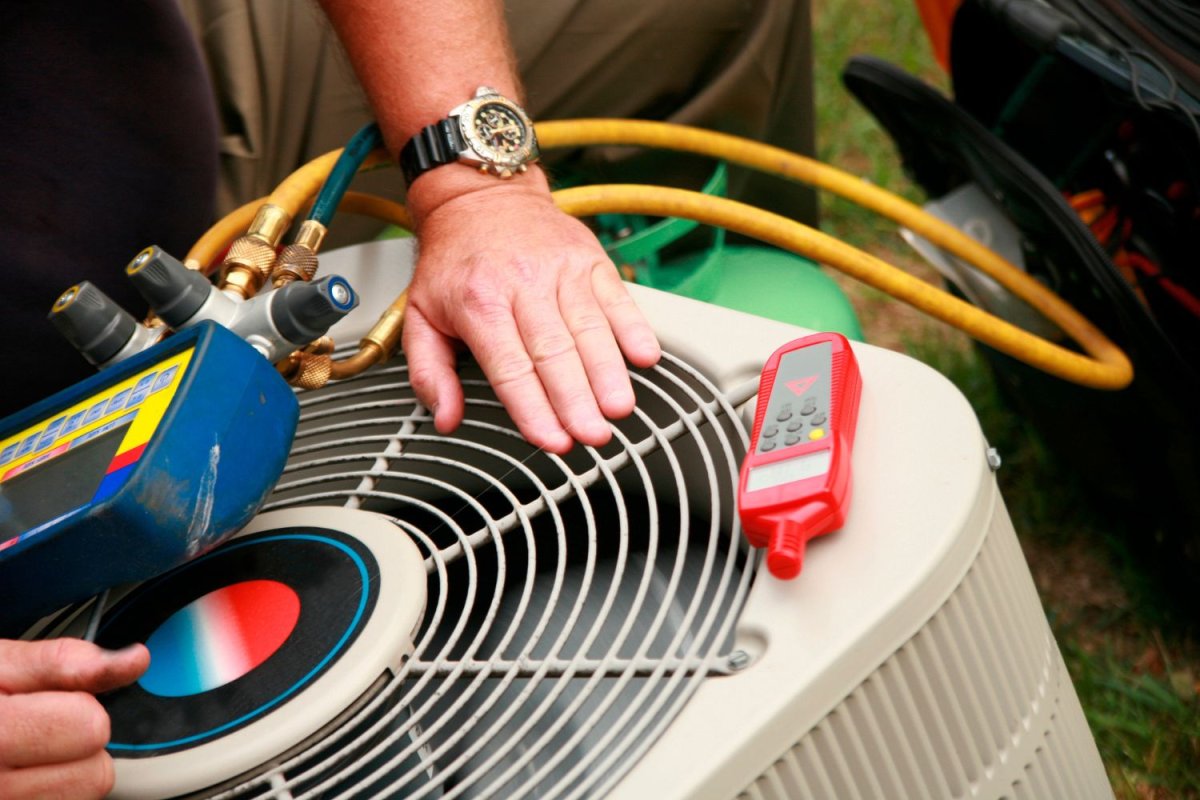

We may earn revenue from the products available on this page and participate in affiliate programs. Learn More ›
- Typical Range: $250 to $400
- National Average: $300
An HVAC system (heating, ventilation, and air-conditioning) keeps a home warm in the winter and cool in the summer. But to keep the system working correctly and efficiently, regular maintenance and inspections are required.
While a homeowner can do things to keep their HVAC system in good working order, such as changing the filter or keeping the surrounding area free of debris, there’s no substitute for a professional inspection.
A typical HVAC home inspection will include thermostat calibration, coolant level and pressure checks, electrical system inspection, evaporator coil cleaning, and additional safety and efficiency checks. The average HVAC inspection cost is $300, though homeowners can expect to pay anywhere between $250 and $400 per inspection.
An inspection can take up to an hour, and while it’s an investment in time and money, HVAC inspections can extend the system’s lifespan while preventing major and expensive repairs. This guide will cover the different types of HVAC inspections and how other factors influence the final cost.
Factors in Calculating HVAC Inspection Cost
The following factors all play a role in calculating HVAC inspection costs. Homeowners can expect to pay between $250 and $400 for an HVAC inspection, with unit type, location, and inspection level influencing the final cost. And while the national average cost of HVAC inspection is $300, local averages can significantly differ.
Homeowners will want to consider how all the following factors may influence the cost of HVAC inspection based on their location and system requirements as they search for “furnace inspection near me.”
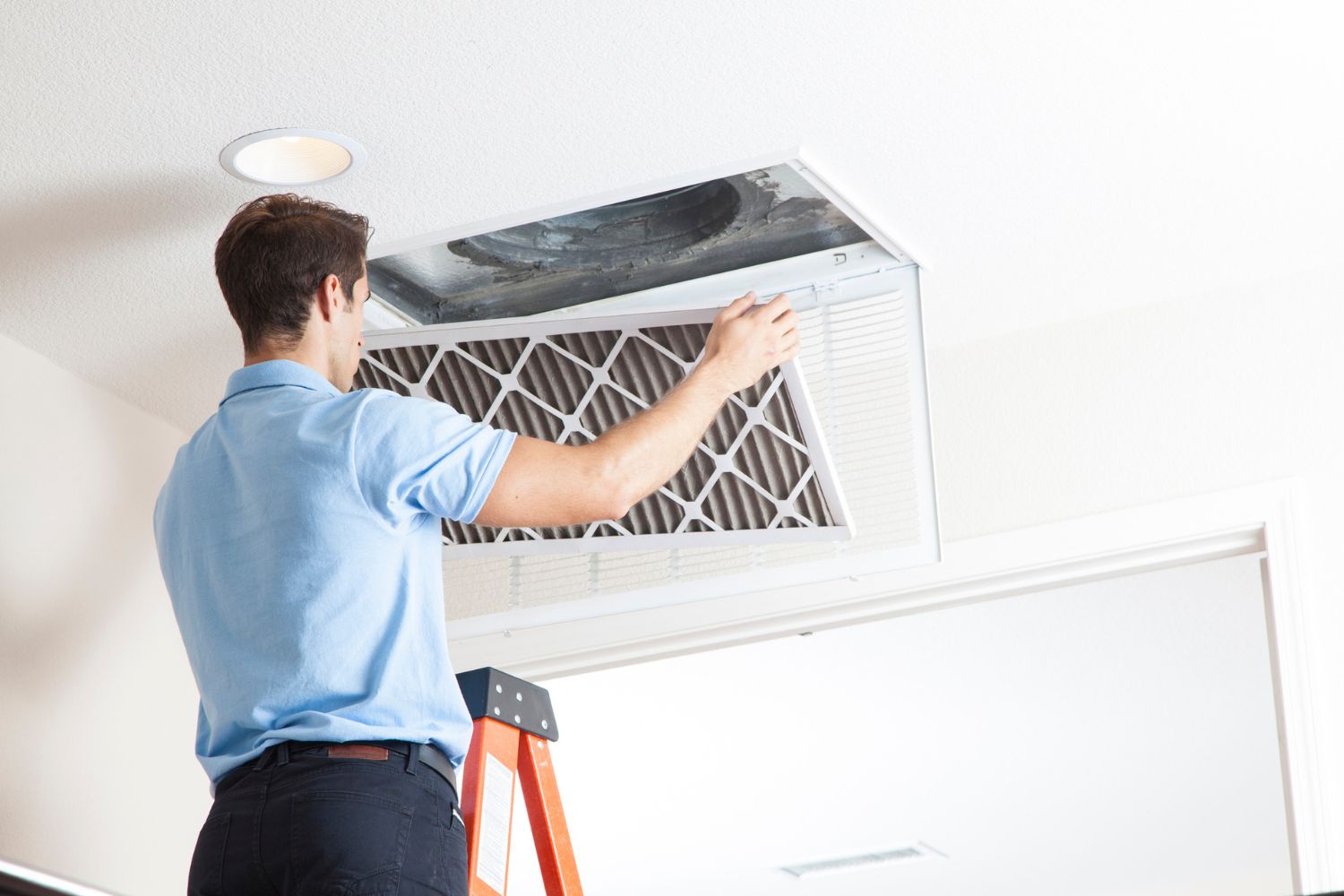
Unit Type
Unit type is one of the most influential factors to consider when homeowners are determining an HVAC inspection cost. While some inspections may focus on only one part of an HVAC system, others encompass more than one component. As can be expected, the more components included in the inspection, the higher the cost will be.
For example, a roof vent inspection costs between $75 and $125. Air duct inspection falls within the same price range, while homeowners can expect to pay between $80 and $100 for either a furnace or attic fan inspection.
Radiant flooring inspections cost a bit more, with a price range between $100 and $125. The checklist for air conditioning maintenance is a bit longer, so the cost of inspecting an AC unit can be as much as $150. Finally, a boiler inspection has the highest price range, costing between $100 and $300.
Unit Location
The location of a home’s HVAC system is essential when it comes to average inspection costs. Inspecting an easy-to-access system tends to cost less than checking a system that requires some creativity to reach.
For example, a furnace sitting in a large laundry room in a basement doesn’t offer many challenges; a contractor can maneuver around the unit and check each component. But part of an HVAC system in an attic or crawl space can be harder to access. Roof vents on a steep roof can be dangerous to inspect.
Generally speaking, the more difficult, time-consuming, or dangerous an HVAC component is to inspect, the more a homeowner can expect to pay.
Home and System Size
A larger home is more likely to have multiple units or multi-zone systems installed to accommodate its additional heating and cooling needs. Multiple units can drastically extend the amount of time an inspection takes, as there are additional thermostats, units, and ductwork to examine. As expected, this can drive up the price.
When homeowners are scheduling an inspection for a home with multiple units or systems, they are advised to hire a contractor with a flat rather than hourly fee. Falling behind on one component can cause the entire inspection to run behind, which can tack on unnecessary additional costs for a homeowner.
Inspection Level
Not all HVAC inspections have identical scopes. Different scenarios call for inspections at different levels, with unique price points.
For example, a seasonal tune-up is a professional inspection that includes cleaning services. Ideally, this lower level of inspection occurs twice a year (once in spring and once in fall) to ensure a system can effectively cool or heat a home in preparation for changing temperatures. Costs for a seasonal inspection can be as low as $70.
A complete HVAC inspection is recommended before a real estate transaction or as a second opinion for repair work. This higher level of inspection is conducted across the entire heating and cooling system, including ductwork, to confirm it is functioning correctly and efficiently.
Because of the additional labor required for a full HVAC inspection, homeowners can expect to pay as much as $500 in some scenarios.
Geographic Location
A home’s geographic location slightly impacts the cost of HVAC inspection. In areas where the cost of living is higher, homeowners can expect to pay more for an HVAC inspection to offset higher labor and material costs.
HVAC inspection costs are likely to follow suit in areas where the cost of living is lower. However, higher demand for contractors can raise inspection costs, even in areas where labor rates are lower than average.
Geographic location can also influence inspection costs due to seasonal differences. Areas with more extreme weather often require additional inspections. Again, high demand can result in higher prices compared to in areas where HVAC systems remain idle most of the year.
Seasonality
The time of year a homeowner schedules an HVAC inspection can influence the price. This is because many HVAC companies offer discounts on inspections during slower months to keep their schedule full.
Furnace emergency calls are typical in the winter, and air-conditioning emergency calls are typical in the summer. This means that if a homeowner waits until a contractor’s busy season to schedule an inspection, they’ll likely pay more to book a time slot.
Since HVAC emergencies are rare in the spring and fall, when more mild temperatures make it easier for a home to go without an HVAC system, appointments tend to be easier to come by and also cost less.
Labor
Not all HVAC contractors charge in the same manner or the same price. This means labor costs vary by job and can influence the final inspection cost.
For example, most HVAC technicians charge between $75 and $150 per hour, depending on regional averages and their experience level. HVAC inspections can take as little as 1 hour to complete, but this doesn’t mean an inspection can cost as little as $75. Many contractors have a minimum HVAC service cost fee that can surpass their hourly rate.
Some HVAC technicians charge flat rates for routine jobs, like HVAC inspections. This can make it more difficult to break down labor costs. While labor does influence an HVAC inspection cost, its impact is mild compared to other factors.
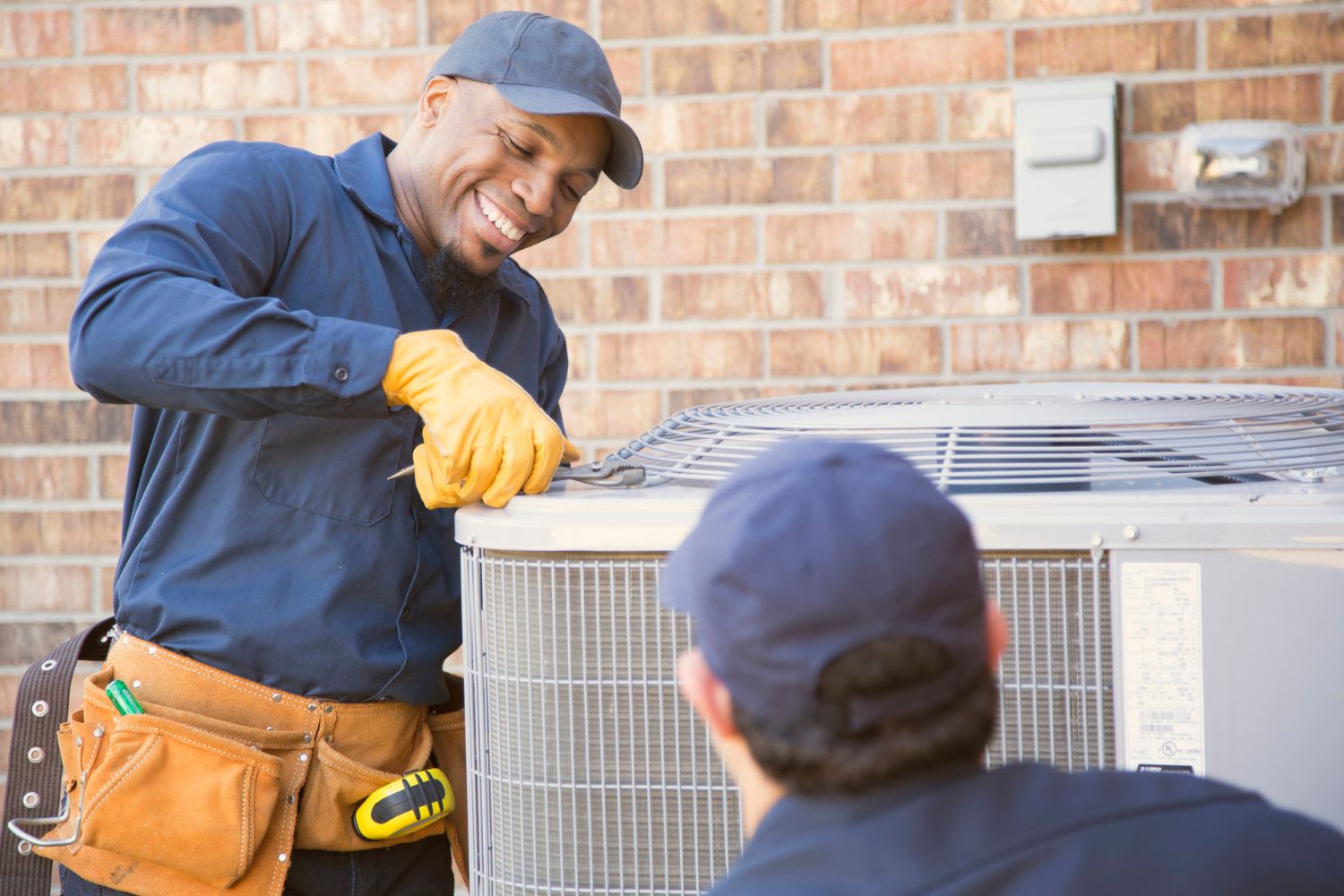
Additional Costs and Considerations
The following additional considerations don’t always influence the cost for an HVAC inspection, but they’re helpful for a homeowner to know when determining their HVAC maintenance budget.
Annual Maintenance Plan
Signing up for an annual maintenance plan isn’t required, but it’s one of the best ways to save money on HVAC inspection costs. Many HVAC contractors offer maintenance plans that include regularly scheduled maintenance visits throughout the year at a discounted rate.
Homeowners can expect to pay between $120 and $360 for an annual maintenance plan, which may include additional benefits beyond the items listed on the company’s HVAC inspection checklist. Some plans offer discounts on parts and repairs, priority service, and reduced repair costs if the unit breaks down while the plan is in place.
With an annual maintenance plan, homeowners can expect their HVAC system performance to improve. In fact, an unserviced system loses about 5 percent of its efficiency per year, which can lead to a 50 percent reduction in system lifespan.
Travel Fees
Travel fees are additional fees added to an HVAC company’s standard pricing that are meant to absorb the extra costs of gas and time a contractor spends traveling to a residence.
Travel fees can be charged by a fixed rate, by the mile, or by travel time increments (e.g., 5-minute increments). Not every HVAC company charges such fees, and for those that do, they may not charge them for every job. For example, a company may charge travel fees only for residents outside a particular service area.
Since all HVAC companies approach travel fees differently, it’s difficult to estimate what a homeowner can expect to pay, but on average, they fall between $25 and $50.
Types of HVAC Inspections
The average cost of HVAC inspection is heavily dependent on the type of unit being serviced. Homeowners can reference the following kinds of units to determine an estimate for their HVAC system inspection.
Roof Vent
A roof vent forms the base of a home’s attic ventilation system. While a roof vent helps protect the roof system from heat and moisture, its main purpose is to allow an attic to breathe as it evacuates humid or hot air. Maintaining a roof vent is essential for the health of a home’s HVAC system.
The average cost of a roof vent inspection is between $75 and $125, with the final price depending on a contractor’s hourly rates and accessibility of the roof vent. An inspector will typically start with an external evaluation of the roof. They’ll check for any raised shingles or other signs that might indicate a blockage impeding ideal airflow within the attic.
Air Duct
An air duct inspection costs between $75 and $125. This type of HVAC inspection verifies the need for duct cleaning and possible repairs. Most inspections use a digital camera to scope a home’s air duct system so a technician can note its condition. If cleaning is recommended, the cost of the inspection is typically applied toward the cost of duct cleaning or any required repairs.
Another type of air duct inspection is a duct leakage test. Homeowners can expect to pay between $250 and $400 for this 1-hour inspection. A combination of equipment, including airflow monitors, pressure-sensing devices, fog machines, and temperature sensors, is used to determine if a home’s duct system is leaking air and losing energy.
If air duct cleaning is required, homeowners can expect to pay an air duct cleaning cost of $750 to $1,000. Regular air duct inspections and cleanings can boost an HVAC system’s efficiency and safety.
Furnace
Investing in furnace inspections is crucial, especially in areas where winter temps can dip dangerously low. On average, homeowners can expect to pay between $80 and $100 for a furnace inspection. A furnace inspection ensures a furnace is operating correctly and safely. Gas and carbon monoxide leaks can be hazardous if they go undetected.
If repairs are necessary, these are charged separately, but routine maintenance and inspections can help reduce the chance of costly repairs. Another way to save on potential repairs is to schedule a furnace inspection a couple of months before the appliance is likely to be used. This can help avoid emergency fees and ensure the furnace is working properly before the cold sets in.
Attic Fan
An attic fan draws in hot, humid air from the attic space and pushes it outside, helping keep the entire home cooler. Without an attic fan, an HVAC system can take more time and energy to cool a home. An attic fan inspection can ensure the fan is operating properly and efficiently.
The average cost of an attic fan inspection is between $80 and $100. A 1-hour inspection typically includes the inspection itself and minor repairs. However, extensive repairs may require additional time and materials, raising the price significantly.
Radiant Flooring
Radiant flooring is another term for heated floors. Electric wires or hot water pipes are installed beneath a room’s flooring, and as they warm, heat radiates up and raises the room’s temperature. Radiant flooring is more efficient than forced air; it eliminates duct losses and offers advantages for people with allergies since it doesn’t distribute allergens.
Radiant flooring can be the only heating element of a home’s HVAC system or work in tandem with other unit types. Either way, a homeowner will want to have their radiant flooring system routinely inspected.
Radiant flooring inspections cost between $100 and $125. During the appointment, the system’s pressure is measured. Low pressure can indicate a leak in pipes. The pump is also inspected for signs of wear and tear.
Air Conditioner
Air conditioners provide cold air inside a home by removing heat and humidity from the indoor air. The unit cools and returns the extracted air, transferring unwanted heat and humidity outside. Without an air conditioner, a home can quickly reach uncomfortable temperatures during the hot summer months.
A homeowner will want to have an air-conditioning inspector routinely inspect the unit to ensure the air conditioner is working correctly. The average air conditioner inspection costs between $100 and $150.
As is the case with a furnace inspection, it’s best to schedule an air conditioner inspection before the unit is needed. This avoids expensive emergency fees and repairs while providing a homeowner with peace of mind that their unit will be ready to operate when needed.
Boiler
Boilers are economical heating options that also require regular maintenance and inspections. They operate by heating water within a vessel, typically made from steel. While steel is strong, it can crack with time and create a dangerous scenario. An inspection by a professional can spot a crack before it becomes problematic.
A homeowner can expect to pay between $100 and $300 for a boiler inspection. The wide range in prices is mainly due to fluctuations in hourly fees by contractors. There are multiple types of boilers, including gas, oil, and coal, all with unique price ranges for inspections.
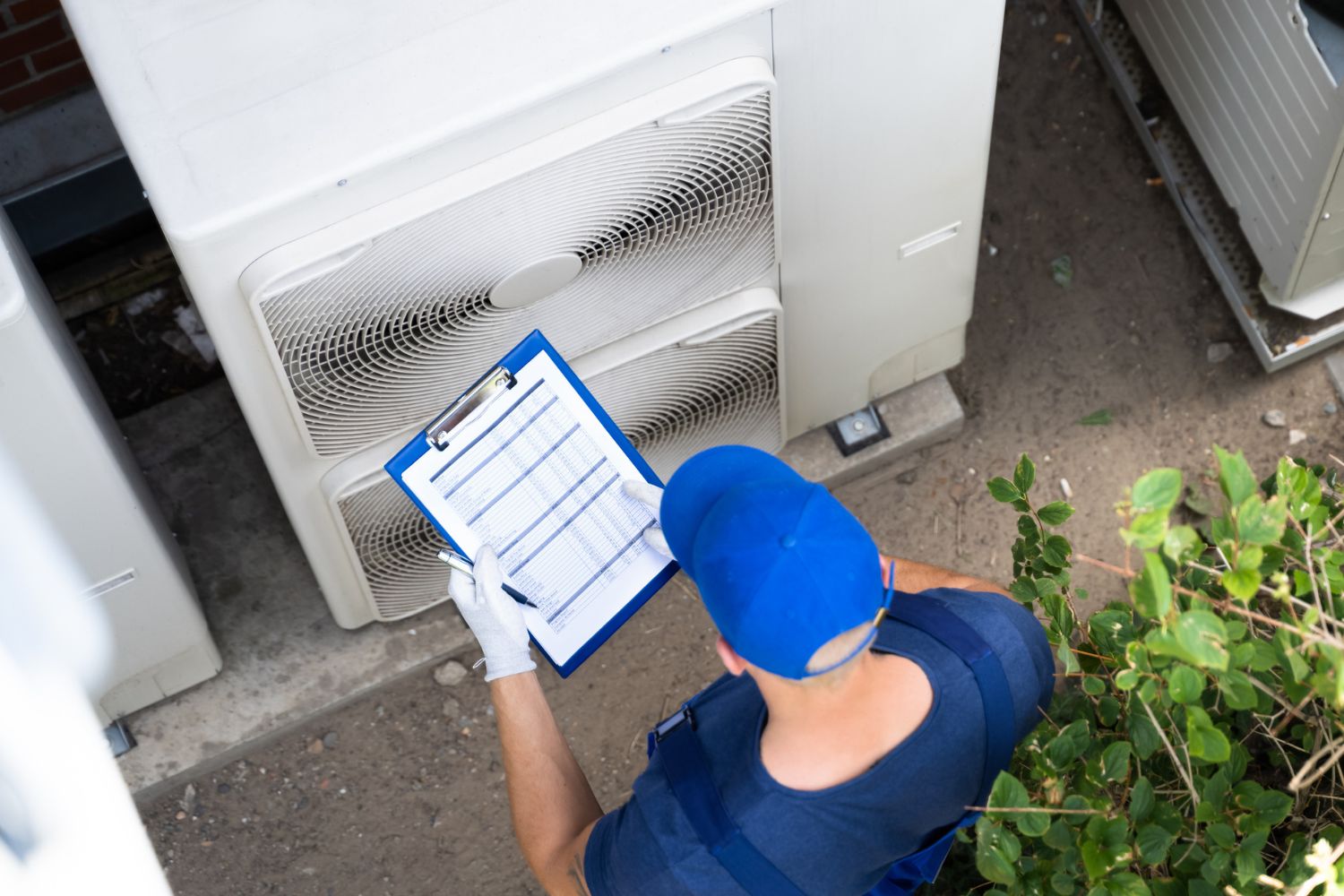
Do I Need HVAC Inspection?
HVAC systems tend to run quietly behind the scenes, but this doesn’t mean a system doesn’t give warning signs that it needs a tune-up. An inspection will need to be scheduled if any of the following signs are present when an HVAC system is in use.
Inconsistent Airflow
Uneven airflow is a common sign of an HVAC system in distress. Causes can be mild and straightforward to fix, such as a covered or blocked vent. Sometimes, changing the filter is enough to fix inconsistent airflow from an HVAC system. Another potential cause for uneven airflow is old or inadequate windows.
But there are more serious reasons behind an HVAC system that’s not blowing cool or warm air evenly throughout the home. An HVAC inspection from a professional can reveal duct leakage, damaged ducts, or issues with a return vent. Then repairs can be made to restore even airflow.
Unusual Sounds or Smells
Not all sounds or smells are reasons for concern for an HVAC system. For example, it’s normal for a furnace to have a slight burning smell when turned on for the first time after months of not being used. This is usually settled dust burning off and will likely dissipate within an hour or so.
Some noises are also common, like chirping or rattling, especially when the unit is starting up or shutting down. But clunking or vibrating noises from an HVAC system can trigger the need for an inspection. The same goes for musty smells that could be from mold or mildew in the ductwork or a burning smell that doesn’t go away.
Inaccurate Thermostat
A thermostat giving incorrect or confusing readings can result in frustration, uncomfortable temperatures, and skyrocketing energy costs. An HVAC system’s air filter can also be clogged and interfere with the unit’s function and thermostat’s ability to read the air temperature.
Sometimes, a thermostat can be installed in a location subject to temperature swings, making it nearly impossible for the device to monitor a home’s actual temperature.
Thermostat sensors can malfunction over time. While a quick cleaning may be all it takes to get a thermostat back up and running, an inspection can determine the actual cause of any misreadings. Most inspections include thermostat recalibration services, which can solve the issue as well.
Increased Utility Bills
It’s expected that utility bills will increase while an HVAC system is in use, but energy costs that seem to skyrocket with no reasonable explanation can point to an issue with a home’s heating and cooling system.
HVAC systems that aren’t routinely inspected lose efficiency with every missed appointment. Dirty filters, duct leaks, low refrigerant, malfunctioning thermostats, and broken-down components can all cause efficiency issues in an HVAC system. Without proper maintenance and routine inspections, an HVAC system will cost more to operate every year.
When utility bills rise, homeowners can look for obvious signs such as higher unit prices or additional appliance usage. But if those all seem normal, higher energy bills could signal that it’s time to schedule an HVAC inspection.
Poor Air Quality
HVAC systems influence air quality in several ways. Most HVAC systems operate with forced air, which can spread dust, bacteria, allergens, and other harmful substances throughout a home.
HVAC systems can also influence air humidity. Air that is too moist or dry can cause discomfort and, in some cases, potential health issues. Excessive moisture can also lead to mold and mildew growth inside the ductwork.
A homeowner will want to schedule an inspection if they notice lingering unpleasant odors, coughing, sneezing, allergic reactions, skin dryness, or difficulty sleeping when an HVAC system is in operation. Having a professional work through an HVAC safety checklist can ensure a family is breathing safe air inside their home.
New Home Purchase
In most cases, a home inspection is required when someone is seeking a mortgage loan. But the average home inspection does not include detailed HVAC testing; in fact, during a basic home inspection, an HVAC system is turned on and off only to make sure it’s operational.
If the seller covers the inspection cost, it may feel like a free HVAC inspection, but it’s not very helpful in determining the health of an HVAC system.
This is why it’s highly recommended that every prospective homeowner schedule a detailed HVAC inspection when purchasing a home. HVAC systems make up for about half a home’s energy usage, and repairs (or, worse yet, replacements) can quickly get expensive.
An in-depth HVAC inspection report can fill a new homeowner in on the status of a home’s HVAC system so they can save money and frustration after closing.
Annual Maintenance
Routine HVAC inspections can extend the life and efficiency of a home’s heating and cooling system. While a homeowner can tackle some annual maintenance tasks on their own, like replacing a filter, part of being a responsible HVAC system owner is scheduling inspections as needed.
Most homeowners will want to have their HVAC systems inspected annually. Older systems may require two inspections per year, while some homeowners may feel more comfortable having their furnaces inspected before winter and air-conditioning units inspected before summer.
One of the easiest ways to ensure an HVAC system is inspected regularly is to invest in an HVAC maintenance program, which offers discounted inspection costs and prime scheduling preferences.
Warranty Requirements
Most HVAC systems come with warranties that require a homeowner to invest in routine inspections by a professional. Skipping out on these inspections can void a warranty. Homeowners are advised to keep records of all inspections in case the legitimacy of their warranty comes into question.
Routine inspections also help spot issues with components that could be approaching the end of their warranty period. A trained and professional HVAC inspector can help a homeowner seek covered repair or replacement before it’s too late.
It’s recommended that homeowners refer to the fine print of any warranty (including whether it transfers to new owners if the system was installed before a home purchase) to ensure they aren’t putting their coverage at risk.
HVAC Inspection: DIY vs. Hiring a Professional
When it comes to HVAC inspections, most maintenance is best left to a licensed professional. In fact, taking a DIY approach to HVAC inspections can void a system’s warranty.
While DIYing an HVAC inspection can save on upfront costs, this approach could set the stage for a hefty repair bill down the road for an issue that would otherwise have been covered. It’s a risk most homeowners are understandably not comfortable taking.
The good news is that there are a few tasks a homeowner can check off an HVAC maintenance checklist on their own. While doing so won’t reduce the cost of an inspection, it may extend the time a system can go between inspections. This can add up to substantial savings over an HVAC system’s lifespan.
Homeowners interested in DIY HVAC inspections can do the following:
- change out filters at least once a year or to their system’s specifications
- keep the area around the AC unit free of grass, shrubs, and debris
- inspect insulation around any exterior units for damage
- keep the inside air vents clean
The cost of DIY preventive maintenance is between $10 and $70 every 1 to 3 months, depending on the type of air filter installed and the frequency of replacement. While this is undoubtedly less than the average HVAC inspection cost of $300, it doesn’t include a professional inspection of the entire heating and cooling system (along with ductwork) to confirm the system is working correctly and efficiently.
So while DIY HVAC maintenance is affordable and relatively safe, it doesn’t offer the same benefits as a professional HVAC inspection. There’s always the possibility of voiding a warranty by going the DIY route. Hiring a professional for routine inspections and maintenance is ideal for keeping an HVAC system in tip-top condition.
How to Save Money on HVAC Inspection Cost
The contractor or company sets most inspection costs, so there’s rarely wiggle room. Instead, a homeowner will want to focus on the benefits of an HVAC inspection rather than ways to lower the price of an appointment. Here are some suggestions.
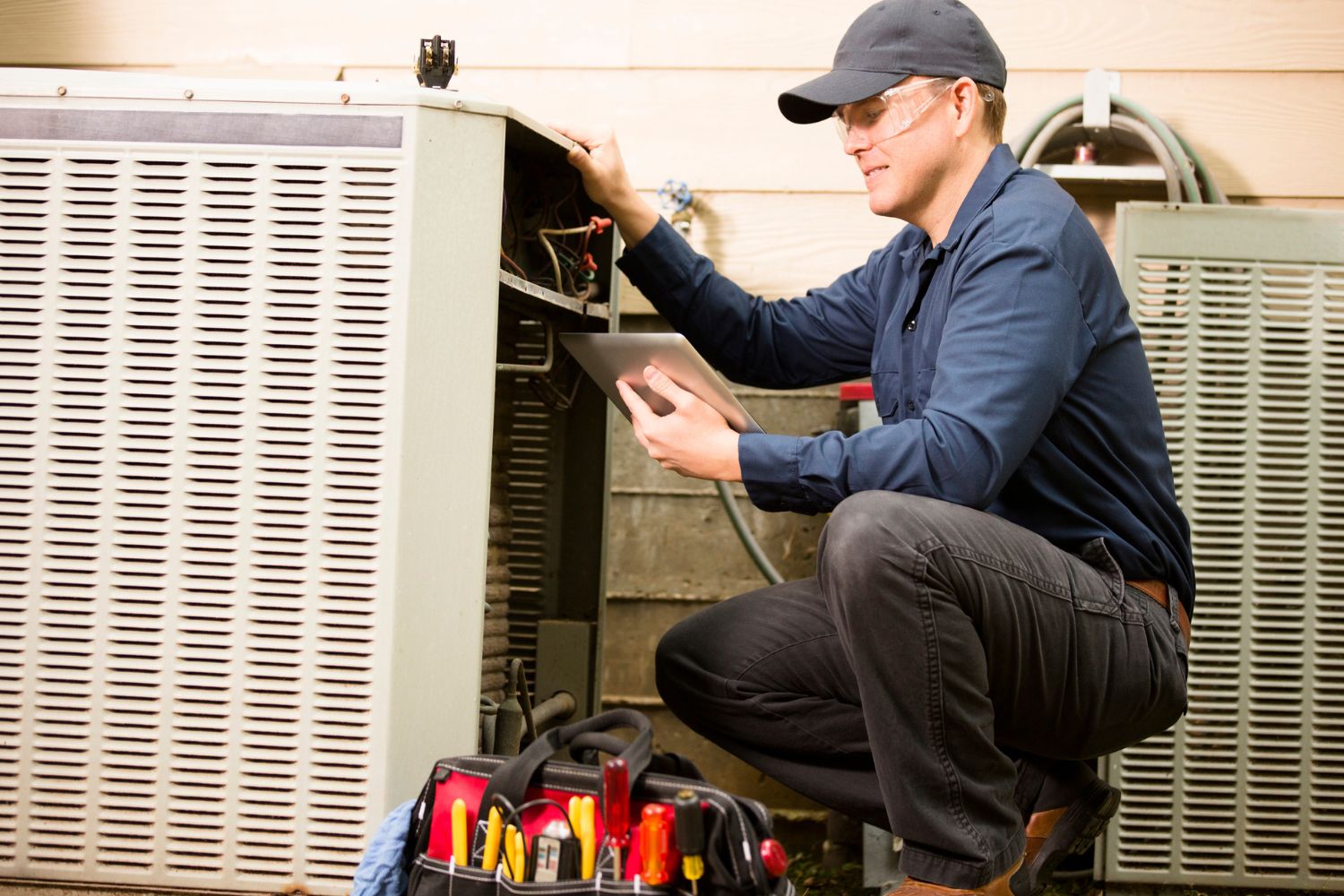
- Keep up on regular inspections. HVAC inspections can save homeowners money in other cost categories. With routine checkups, problems can be detected when they’re minor and repaired before costs get out of control.
- Shop around for contractors. Homeowners will want to work with a certified HVAC inspector, but it’s worth shopping around for the best pricing. Some contractors offer maintenance packages that include routine inspections, scheduling priority, and the potential for additional savings. Even though a certain contractor may not be the least expensive option, some plans often make up for added upfront costs with additional perks.
- Schedule during the off-season. HVAC service prices tend to go up during peak seasons. Scheduling inspections during the off-seasons (typically spring and fall) can lock in lower costs and better appointment times.
- Focus on year-round maintenance. Many homeowners schedule an HVAC inspection and then forget about maintaining their system until the next appointment. Instead, homeowners will want to focus on regularly replacing filters, sealing doors and windows, and using a smart thermostat. These steps ensure an HVAC system isn’t pushed too hard, and while this approach may not reduce the cost of an inspection, it can prevent additional tune-ups and repairs.
Questions to Ask About HVAC Inspection
Finding the right HVAC inspector can make all the difference in a homeowner’s inspection experience. The following list of questions can help guide cautious homeowners as they search for the best HVAC companies to complete their HVAC inspection.
- How long have you been inspecting HVAC systems?
- Are you licensed and insured?
- Do you work alone, or do you have a team that assists you?
- Can you offer repair services or provide references if something is wrong with my HVAC system?
- How can I improve my indoor air quality without purchasing a new system?
- Do you recommend a smart thermostat, and if so, what are the benefits?
- Do my air ducts need to be cleaned?
- Does your company offer maintenance plans, and if so, what’s included in the price?
- I know my HVAC system is nearing the end of its lifespan. Should I focus on repairs or start budgeting for a new unit?
- When should my next maintenance appointment be?
- What can I do between maintenance appointments to keep my HVAC system running efficiently?
- What’s the ideal temperature to set my thermostat at during the summer and winter?
- How energy efficient is my unit compared to newer models?
FAQs
HVAC inspections may be an additional expense, but they are a necessary part of the cost of heating and cooling a home. By keeping an HVAC system running efficiently, homeowners can save in other home cost categories, absorbing some of their upfront HVAC maintenance fees. The following FAQs can help a homeowner understand HVAC inspection costs and procedures.
Q. When is the right time to do an HVAC inspection?
The best time to schedule maintenance is before a system is needed the most. This means a furnace will ideally be inspected in the fall, and AC inspections will ideally occur in the spring. But what’s more important than when to have an inspection is how often. A homeowner will want to have their HVAC system inspected by a professional at least once a year.
Q. How can I test my HVAC system on my own?
Start by making sure the thermostat is working properly. Raise or lower the thermostat to make sure the unit kicks in. If the thermostat is functioning, shut off the power to the unit, take the protective cage off the fan, and remove any excess debris using a wet/dry vacuum. Finish the inspection by cleaning the evaporator coil, checking the evaporator drain, and replacing the filter.
Q. Is HVAC inspection cost the same in all states?
Actually, home HVAC inspection costs are different in all states and vary by geographic location. States with a higher average cost of living are likely to have higher inspection costs than states with a lower average cost of living.
Q. How long does an HVAC inspection last?
The duration of an HVAC inspection depends on the size of the home, the number of service checks performed, and the size and type of the system, along with its location in or around the home. But on average, a comprehensive HVAC inspection takes between 1½ and 2 hours to complete.
Q. How often should I have my HVAC system checked?
Most homeowners will want to have their HVAC systems inspected once per year. However, systems older than 10 years typically need to be inspected biannually. Ideally, a buyer will want to have the home’s HVAC system inspected before the purchase or sale of a home. Finally, it’s advised to have an HVAC inspection completed as needed for a second opinion when HVAC repairs are on the table.
Q. What are the most common problems with HVAC systems?
Common HVAC system problems include dirty filters, blown filters, and water leaks. Other signs that signal a potential problem with an HVAC system include a blower that runs continuously or a furnace that makes unusual or concerning noises. Most HVAC problems are caused by mechanical wear and tear, which is why routine inspections are so important.
